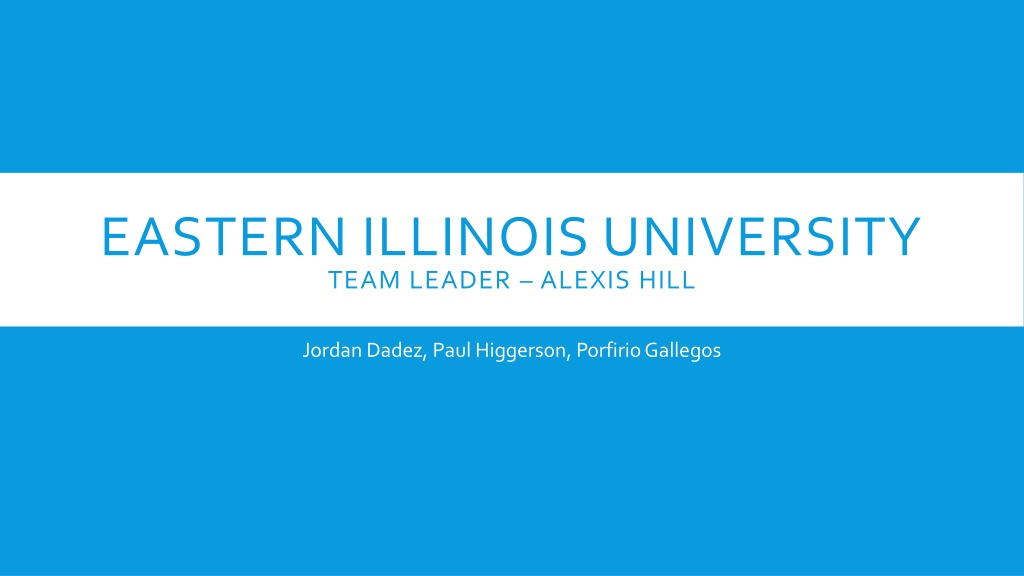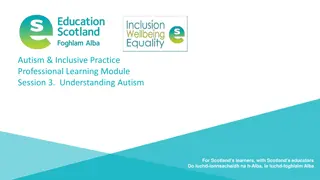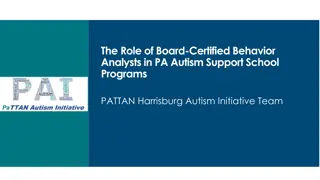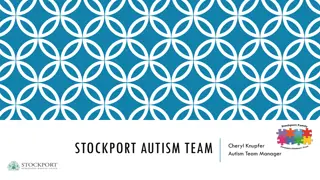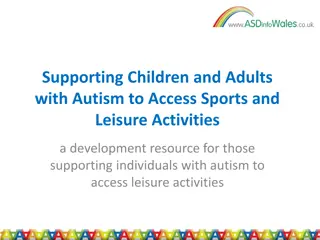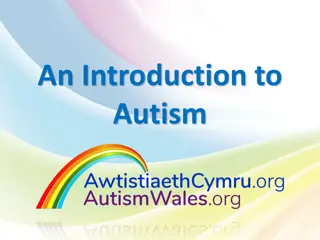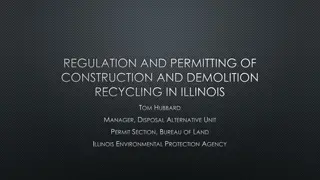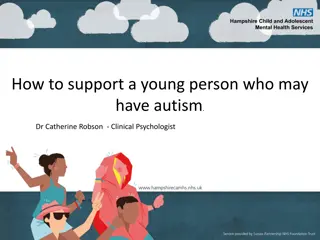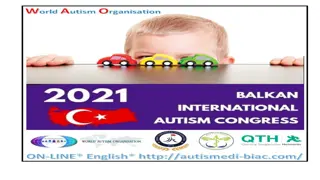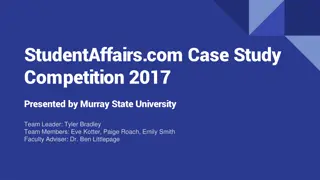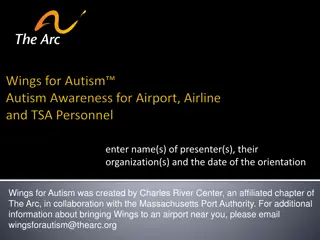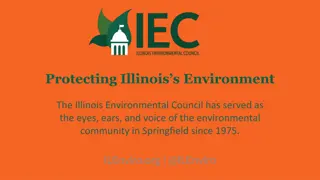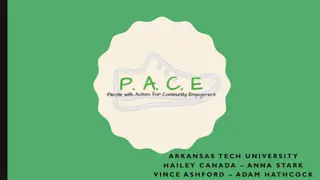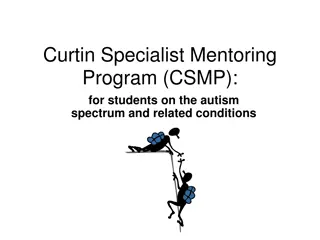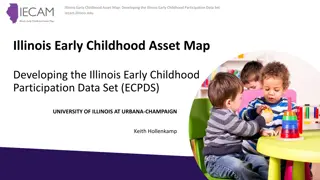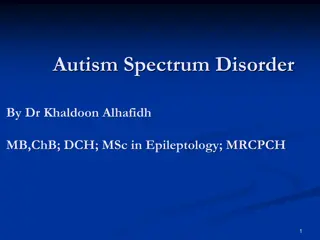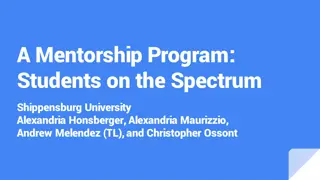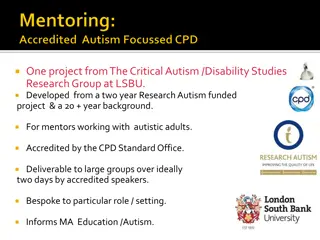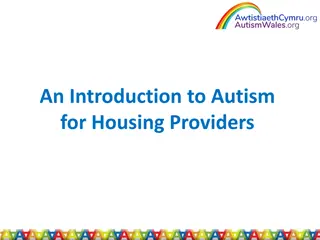Empowering Students with Autism at Eastern Illinois University
Explore the impactful R.I.S.E. program at Eastern Illinois University, dedicated to integrating students with autism into society by providing academic, social, and interpersonal skills. The program offers personalized support, mentorship, and a structured pathway for students to excel and overcome barriers associated with Autism Spectrum Disorder.
Download Presentation

Please find below an Image/Link to download the presentation.
The content on the website is provided AS IS for your information and personal use only. It may not be sold, licensed, or shared on other websites without obtaining consent from the author. Download presentation by click this link. If you encounter any issues during the download, it is possible that the publisher has removed the file from their server.
E N D
Presentation Transcript
EASTERN ILLINOIS UNIVERSITY TEAM LEADER ALEXIS HILL Jordan Dadez, Paul Higgerson, Porfirio Gallegos
HISTORY & IMPORTANCE In the Fall of 2015 with data collected from all 50 states in the United States there are currently 5.9 million enrolled in public education who live with a disability. (Samuels, 16) Autism identification and diagnoses has increased to 144% within the last 10 years, approximately 560,000 students (Samuels, 16) Currently not enough programs exist in public universities to handle the large increase in students with disabilities such as Autism that are seeking higher education (Samuels, 16)
COMMITTEE STRUCTURE Co-Chairs Director of Disability Services Assistant Director of Leadership Programs -Office of Residence Life Committee Members Director of Admissions Live-in Associate Resident Director in the Residence Life department Dean of Education Department Program Coordinator from the Office of Student Activities Director of Mental Health Services
PROGRAM OVERVIEW R.I.S.E Reaching and Integrating Students with Autism into Excellence Two-Tier Program "Ascend" Catered toward first-year students, course requirement, on-campus requirement, 1:1's with the Director of Disability Services bi-weekly, mandatory study hours, required meetings with mentor "Surge" Catered toward those who graduated from "Ascend" or transfer students, mentorship program, on-campus option, on-going until graduation Personal, social, and academic integration through a variety of programs, resources, and opportunities
R.I.S.E. MISSION STATEMENT The R.I.S.E. program is committed to helping students on the spectrum successfully integrate into society through learning helpful academic, social, and inter-personal skills. By participating in our program, students will be able to R.I.S.E. above the stigma associated with Autism Spectrum Disorder.
PERSONAL INTEGRATION Work with residence life administrator to develop a Living Learning Community Trained Resident Assistant will be on the floor Good experience for someone who is majoring in Special Education or equivalent Specified and unique quiet hours Scheduled leisure activities "Lights Out" time Assists with routines
SOCIAL INTEGRATION Mentor program Encourage them to go to on-campus events Monthly requirement to go into a larger city with mentors to experience city living Living Learning Community Will help encourage social interactions with individuals in the programs as well as in the building through hall-wide and campus-wide programming
ACADEMIC INTEGRATION Study hours Early alert program "Life Skills" foundations course requirement See next slide for course curriculum Disability Awareness Month (October) campus program Reduced course load for first year in program 9 hours is considered full-time for those in the program, 12 for other students Adapted from (Hees, Moyson, & Roeyers, 2015)
ACADEMIC INTEGRATION LIFE SKILLS COURSE CURRICULUM Academic: Week 1 Study Tips & Tricks Week 2 Note-Taking Strategies Week 3 Time Management Skills Social: Week 4 Introduction to the mentorship program Week 5 Field trip to a local museum (and mentors come with) Week 6 Conversational Skills Week 7 Attend an on-campus event
ACADEMIC INTEGRATION LIFE SKILLS COURSE CURRICULUM (CONT.) Personal: Week 8 Developing Personal Relationships Week 9 Positive & Negative Habits Week 10 Budgeting Strategies Week 11 - Field trip to a grocery store (to show them how to shop and budget effectively) Emotional: Week 12 Self-Esteem Week 13 Showing Appreciation Week 14 Watch "The Story of Luke" Week 15 Reflection
DIRECTOR OF DISABILITY SERVICES This Director is one the Co-Chairs for the R.I.S.E. Program make up. They are directly in charge of making sure of the integration of all departments for the R.I.S.E. program Their role working with the Admissions process is the determination of the students ability to be "College Ready". Meaning their ability to function with the RISE program and work with the resources available to them Their role working with the Housing Department in having a direct 1:1 with Associate Resident Director to gauge the community within the R.I.S.E. Learning Floor.
DIRECTOR OF ADMISSIONS The Director of Admissions is directly in charge of the early admissions day specifically catered to students who are enrolled in the R.I.S.E. program They are also directly in charge of overseeing the admissions councilors that are in charge of handling the R.I.S.E. student application. They work in coordination with the Director of Disability Services to determine a students application. This includes the determine if a students "College Ready". Working hand in hand with the applicant.Collection of the applicants admissions paperwork. Making sure the perspective student has met the criteria for the university admissions standards.
LIVE-IN ASSOCIATE RESIDENT DIRECTOR The Associate Resident Director would directly supervise the specially trained Resident Assistant, and meet with them weekly. The Associate Resident Director would serve the appropriate number of weeks on the on call schedule. The Associate Resident Director will c0-advise the mentorship program with the Dean of Education. The Associate Resident Director will assist with early move in of residents. The Associate Resident Director will plan at least one building-wide program a semester for the residents. The Associate Resident Director will work to create a safe and fun environment through university policies for the residents as well as carry out administrative duties for their building.
DEAN OF EDUCATION DEPARTMENT Co-advise mentorship program with Live-in Associate Resident Director. Oversees and chairs faculty instructors teaching Life Skills Foundations course. Promotes awareness of the R.I.S.E Program, its mission, and the role of R.I.S.E on campus. Coordinates efforts between departments to ensure that R.I.S.E. core mission and objectives are being met. Chairs advisory committee that assesses and evaluates all aspects of R.I.S.E.
DIRECTOR OF MENTAL HEALTH SERVICES The Director of Mental Health Services is responsible for overseeing the mental health programs and works hand-in-hand with the R.I.S.E. Program. This department will house the certifying officials responsible for ensuring that all applications are prepared for the social rigors and will be a good fit for the R.I.S.E. Program. They will work jointly with the Office of Admissions and Disabilities. Advisory support and assistance in students transition to college will be functions of this department (Toor, Hanley, & Hebron, 2016). Point of contact for students in times of confusion to assist them with questions and to help them feel safe (Hees, Moyson, & Roeyers, 2015).
PROGRAM COORDINATOR -OFFICE OF STUDENT ACTIVITIES The program coordinator will serve as the liaison between the co-chairs of the R.I.S.E. program. The program coordinator will serve as the liaison between the Office of Student Activities. The program coordinator will work with the Assistant Director of Leadership Programs to plan and facilitate the off campus field trips for the Life Skills Foundations course. The program coordinator will coordinate with organizations on campus to provide safe social outlets and spaces for R.I.S.E. participants.
ASSISTANT DIRECTOR OF LEADERSHIP PROGRAMS OFFICE OF RESIDENCE LIFE Directly in charge of the coordination of the field trips within in the "Life Skills Foundations course" Directly in charge of the campus wide program for the campus to better integrate the students involved within the R.I.S.E. with the student population. During the course of the campus wide program they are also in charge of the application of new possible Mentors into the program Directly in charge of the Early notification system for the students enrolled in the R.I.S.E program. This program allows professors as well as campus officials the opportunity to directly let the students ARD and Resident Assistant receive notification when they are falling behind academically or when a possible incident happened on campus. Also directly overseas the Mentor ship program application and hiring process.
IMPLEMENTATION Phase 1 (March-May) Finalization of program Recruitment of Resident Assistant position Recruitment of live-in graduate assistant Phase 2 (May-June) Advertise the program to incoming first-year students Recruit peer mentors Finalize "Life Skills" curriculum and syllabus Phase 3 (July-August) Host early move-in dates and orientation programs for incoming R.I.S.E students Host Q&A with faculty
RESOURCES Almendrala, A. (2014, March). More children with Autism are goingtocollegethan ever before (and 5 other key findings). The Huffington Post.Retrieved from: http://www.huffingtonpost.com/2014/03/11/research-autism-spectrum_n_4939200.html Autism Speaks, March 31 2016.CDC update on autism shows gap between early concerns and evaluation. Retrieved from: https://www.autismspeaks.org/news/news-item/cdc-update-autism-shows-gap-between-early-concerns-and-evaluation. Eastern Illinois University, N.D.Students with Autism transitional educationprogram (STEP). Retrieved from: http://www.eiu.edu/step/. Eastern Illinois University, N.D. 16-17 ARD job description. Retrieved from: http://www.eiu.edu/housing/pdfs/ard/16- 17%20ARD%20JOB%20DESCRIPTION.pdf. Samuels, C. A. (2017). Spec. Ed. Enrollments Rise. Education Week, 36(19), 6. Toor, N., Hanley, T., & Hebron, J. (2016). The Facilitators, Obstacles and Needs of Individuals With Autism Spectrum Conditions Accessing Further and Higher Education: A Systematic Review. Journal Of Psychologists & Counsellors In Schools, 26(2), 166-190. doi:10.1017/jgc.2016.21 Hees, V., Moyson, T., & Roeyers, H. (2015). Higher Education Experiences of Students with Autism Spectrum Disorder: Challenges, Benefits and Support Needs. Journal Of Autism & Developmental Disorders, 45(6), 1673-1688. doi:10.1007/s10803-014-2324-2
